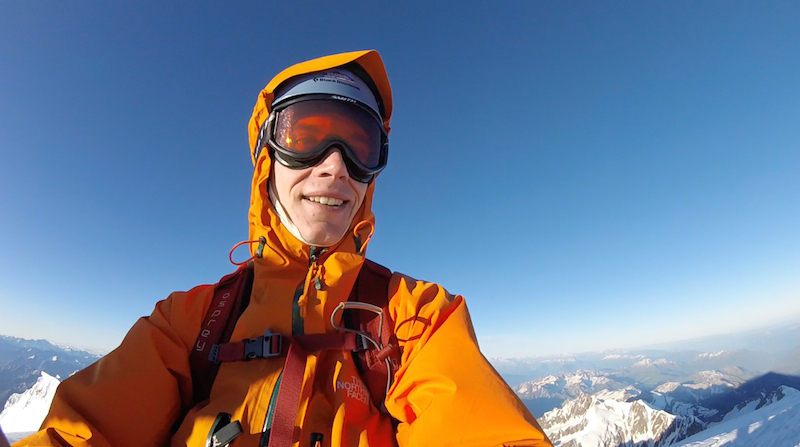
Summit selfie: Peter Trokajlo atop Mt. Blanc // Photo: submitted
CANDID: Meet Peter Trokajlo
UM Today asked assistant professor David Herbert for a gregarious student to interview. Almost instantly the name “Peter Trokajlo” was emailed back. He is indeed gregarious, as well as jovial, punctual and an all-around nice person. He’s one of those people that make you question if you’re doing enough in your own life — seizing the day, and all that.
Trokajlo is one of the roughly 3,800 students enrolled in the University of Manitoba’s Faculty of Graduate Studies. UM Today sat down to chat with him to learn about his explorations, both in the lab and in foreign lands.
Master’s student: Peter Trokajlo
Studying in: The department of chemistry
Advisor: Assistant professor David Herbert
UM Today: What is it you research in Hebert’s lab?
Peter Trokajlo: I’m working on making cyclic polymers – so playing with, and fine-tuning, the molecular architecture of polymers. These are intended to be used as medications.
Plastic? What sort of drugs are you making out of plastic?
Anti-cancer drugs.
Is the plastic a delivery system?
Yes, it’s a way to make it properly reach the target. So in this case, a solid tumour. I’m tackling the problem from a synthetic point of view. Chances are I won’t see the downstream effects of this. For me it’s more learning about synthesis in chemistry and I’m developing that skill set.
Part of the work is to predict if this delivery method would work – it would be a different laboratory deciding if this product would be worthwhile as a medication. My job is to make it – to make the new molecule.
How did you get into this line of research?
I was always interested in biomedicine and biomedical application of polymers.
There’s a researcher, Dr. Langer, that I heard a whole bunch of TED talks on and a PBS program when I was in high school. I was fascinated by his work. He’s a big name guy from MIT in chemical engineering and I began looking for other researchers who are doing work in this field. Dr. Herbert was coming into the department when I was looking for a project like this. I told him I was interested in this biomedical engineering side of things and he suggested this project.
Where are you from?
Winnipeg.
Did you do your undergrad here as well?
I did.
Why did you decide to stick around?
This project.
What did you want to be as a kid?
As a little kid I had so many dreams that would change on a weekly basis.
For me it was like this. I was taking courses in organic chemistry, biochemistry, physical chemistry, and analytic chemistry. And I took these courses just because I had an interest in them in high school. And I put a lot of work into doing well in these courses and after I put a lot of work into it I noticed that I enjoyed them. So I continued taking more chemistry courses. And that’s how it led me up to this point.
I don’t think I would have liked chemistry if I didn’t initially put the work into it.
What is it about chemistry that you started to like?
I use this bumper sticker answer: as a kid I played with Legos and enjoyed putting stuff together. I enjoy making things. And as an adult, the Legos are my molecules. I put molecules together. Or try to at least.
Does it bug you when you see signs on, say, soap that read “chemical free”?
I know a few people that are bothered by this. Everything is chemistry. Everything involves some sort of chemical. But I never go down that path. I don’t want to frustrate myself on purpose.
What are your hobbies? You have quite the set of biceps. You look like you’re a climber or something.
Thank you. I don’t know if Dr. Herbert mentioned this but I did climb two mountains this summer.
No. I just guessed. You have the same kind of arms as another grad student who climbs.
So I climbed Mount Blanc in France. 4,800 meters. You should double check that number though.
And Gran Paradiso in Italy, which is 4,060 meters.
These are my first two mountains. They are something I always wanted to try.
My younger brother climbed Mount Kilimanjaro two years ago and he said it was an incredible experience – it was challenging. It was something that you wouldn’t experience here in North America. And so I had to try it.
I may be ignorant on this, but isn’t summiting Mount Kilimanjaro achieved by a difficult hike up a path, whereas you’re actually climbing mountains if you’re summiting Mt. Blanc. Rope work and all that?
Yes.
So you really surpassed him there.
I did. And I’m happy about that.
How did it feel to summit?
It is very gratifying. Very, very gratifying.
Does the impact hit you later? Like, are you too tired to really grasp what you just did? Or is it an immediate thing?
I was hit with goosebumps the second I hit the top.
The way that one member of our climbing crew described it was “euphoric misery.” So you put yourself through misery. You sleep in dirty huts. You wake up at 1 a.m. to switchback up a mountain. You go through dangerous passages. You’re never fully rested and you have a risk of altitude sickness. There’s all this misery but it’s worth it once you hit the top.
I don’t know if it’s a certain personality that chases those kinds of things, but he described it as euphoric misery and I would agree with it. You go through the misery for the euphoria at the end.
Are you going to do others?
I would really, really like to. I‘m looking at mountains right now—at what I would like to climb and what is appropriate with my experience level, and who else would like to go.
Were you a climber a kid, climbing trees and stuff?
No never. But now I find I am.
What else do you do?
I volunteer at the Seven Oaks Hospital.
Doing what?
My most recent position was a “friendly visitor” so you just go from patient to patient and chat with people who might not have family members able to visit them. Or people who just need more social stimulation.
How did you get into this?
It was encouraged at my high school. I went to Sisler, and they really encourage you to get involved in the community. So I took part.
What’s your favourite part of being a grad student?
I like the freedom with my schedule. You have some freedom as an undergrad, like choosing when your classes are. But as a grad student, I love being able to decide, okay for this day I’m going to run these experiments. So, say I only want to work four or five hours, I can if that’s all that needs to get done that day. There’s significantly less structure to a graduate program. There’s a lot that has to be learned on my part. I have to seek that knowledge. And it’s not always the easiest thing to do. But I’m finding it encourages personal growth. It makes you uncomfortable. But uncomfortable in a good way, in that you get better at learning.
Do you have any regrets?
I wish I could make more mistakes so I could learn more from them. I wish I would be less afraid to make mistakes.
Do you think you’re too cautious?
Yes. I think I should take more risks.
In the lab or life?
In everything.
I feel mountain climbing is risky. You’d be tough to insure.
Yeah, I guess, but I think more would be important. That’s my biggest regret.
What’s your favourite element?
Oh man! I’ve never been asked that. What element is my favorite? That’s actually a really good question. Huh.
What was the first to pop into your head?
Three popped into my head: tungsten, hydrogen and phosphorous. But for no apparent reason.
I’m just thinking now. Huh. What is my favourite? I want to answer this question well. What element and why? It’s such a simple question.
[17 seconds later]I’ll give you a cheesy answer. Carbon because all life is made from carbon….I was trying to think of iridium or platinum or palladium. Some fancy metal. But carbon is good.
Research at the University of Manitoba is partially supported by funding from the Government of Canada Research Support Fund.







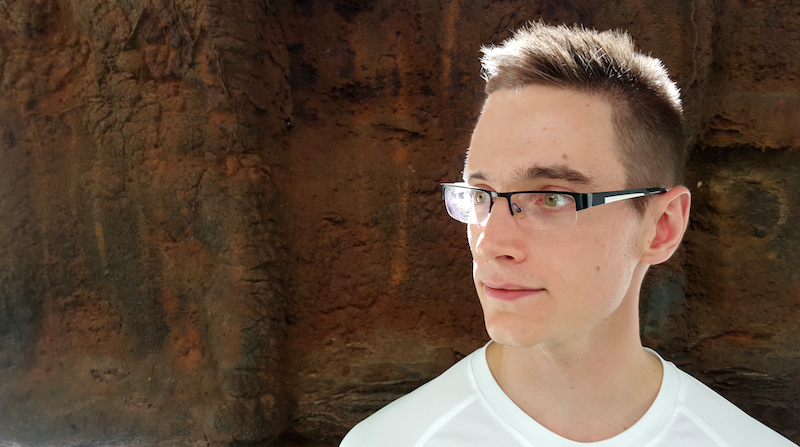
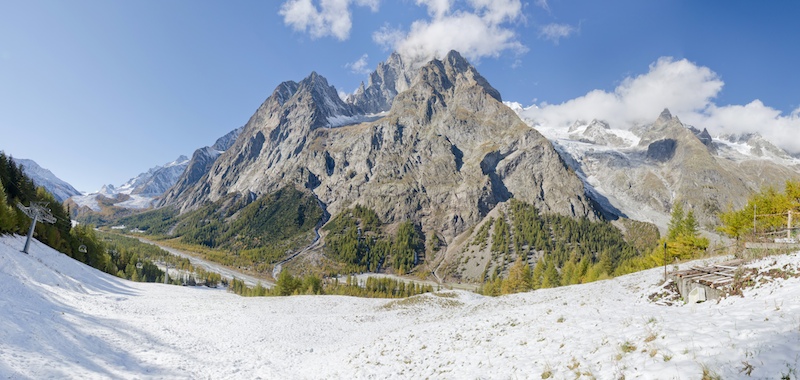
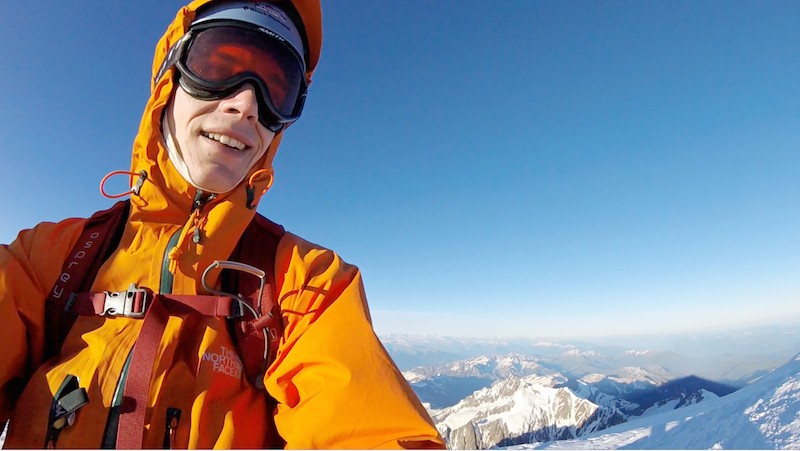

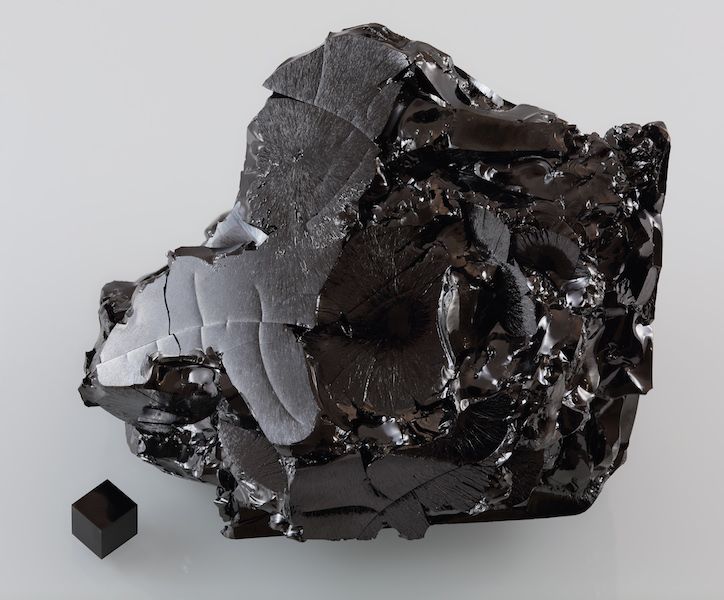
I have had the privileged opportunity to observe this lad since he was very young. I am the least surprised he has reached such a level of competence in all he has tried. He puts his heart and soul into all he does. You cannot find a more conscientious person, student and reliable family member. He will be a very positive asset in whatever he gets involved with.